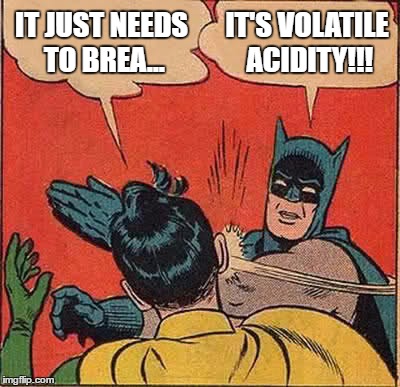"Just pour the wine, it can't be corked right?"
I hear that a lot, almost every time I open a bottle of wine that is not closed by cork. And indeed, the wine won't be "corked", but it still could be faulty.
Faulty? As in malfunctioning faulty?
Yes, as faulty as your mobile's latest OS release; it kinda works all right but there's something wrong in it. The term "corked" refers to only one of many possible faults.
Many possible faults? How many more of them apart from corked?
Well, if we stick to wine bottles that use screw caps I'd focus on these three:
Reduction (a.k.a. sulphides)
What's that?
You'll find this when the wine isn't able to absorb oxygen, or "breathe" (as screw caps have tight-fitting seals which prevent the air from getting in). It happens because when naturally occurring sulphides degrade in wine, they produce the compound thiol, which gives sulphur its smell. Actually, this is a lot more complicated and Jamie Goode does a hell of a job at explaining Mercaptans and other volatile sulfur compounds in wine.
How do you know?
There are whiffs of rotten eggs, rubber, struck match or cabbage.
How do you fix this?
By decanting the wine - oxygen will neutralise thiol. Easy. Unless those ugly smells don't go.... then there's no fix.
Oxidation
What's that?
The opposite of reduction, when the wine has been exposed to oxygen because of careless winemaking or, more commonly, a faulty cork. Oxygen is an aggressive element and will interact with most substances, resulting in their degradation; think a peeled banana or apple and how fast it turns brownish-black. Yes, this is most common on wines bottles with corks, but it is a possibility nonetheless.
How do you know?
Your wine won't smell of fruit, it won't taste of much either, it'll be dull and sad. It will actually taste a bit like sherry or madeira (which are oxidative in style, by design) but in a bad way.
Nope, there's no fixing this one.
So, as a consumer you can't prevent these faults. I'd strongly suggest you taste every bottle you order, yes every single one of them. And if you smell something odd, do not hesitate to ask your server, it might be a super funky wine, but it could also be a super faulty bottle and you don't want to drink it.
I hear that a lot, almost every time I open a bottle of wine that is not closed by cork. And indeed, the wine won't be "corked", but it still could be faulty.
Faulty? As in malfunctioning faulty?
Yes, as faulty as your mobile's latest OS release; it kinda works all right but there's something wrong in it. The term "corked" refers to only one of many possible faults.
Many possible faults? How many more of them apart from corked?
Well, if we stick to wine bottles that use screw caps I'd focus on these three:
Reduction (a.k.a. sulphides)
What's that?
You'll find this when the wine isn't able to absorb oxygen, or "breathe" (as screw caps have tight-fitting seals which prevent the air from getting in). It happens because when naturally occurring sulphides degrade in wine, they produce the compound thiol, which gives sulphur its smell. Actually, this is a lot more complicated and Jamie Goode does a hell of a job at explaining Mercaptans and other volatile sulfur compounds in wine.
How do you know?
There are whiffs of rotten eggs, rubber, struck match or cabbage.
By decanting the wine - oxygen will neutralise thiol. Easy. Unless those ugly smells don't go.... then there's no fix.
Oxidation
What's that?
The opposite of reduction, when the wine has been exposed to oxygen because of careless winemaking or, more commonly, a faulty cork. Oxygen is an aggressive element and will interact with most substances, resulting in their degradation; think a peeled banana or apple and how fast it turns brownish-black. Yes, this is most common on wines bottles with corks, but it is a possibility nonetheless.
How do you know?
Your wine won't smell of fruit, it won't taste of much either, it'll be dull and sad. It will actually taste a bit like sherry or madeira (which are oxidative in style, by design) but in a bad way.
Nope, there's no fixing this one.
Volatile Acidity or VA (a.k.a. Acetic acid)
What's that?
It is a natural part of the fermentation process and is mostly caused by yeast and bacteria in the wine, creating acetic acid — the acid that gives vinegar its characteristic flavour and aroma. Which means, all wine has it to some degree; if it has a lot of it, then it's no good.
How do you know?
You'll smell nail varnish, vinegar or glue instead of fruit in your glass.
How do you fix this?
Sadly, unless you have a Reverse Osmosis machine, there's nothing you can do.
So, as a consumer you can't prevent these faults. I'd strongly suggest you taste every bottle you order, yes every single one of them. And if you smell something odd, do not hesitate to ask your server, it might be a super funky wine, but it could also be a super faulty bottle and you don't want to drink it.
Unless you're blind drunk of course, in which case it doesn't really matter, right? Just top up the glasses mate!!!

Comments
Post a Comment